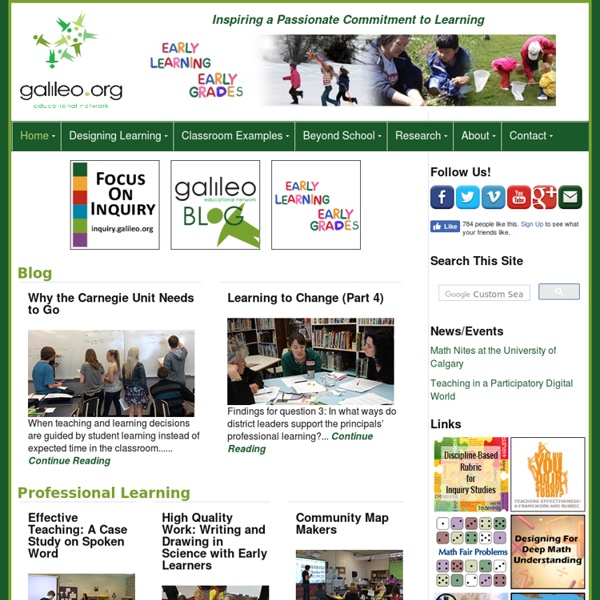



Reading Comprehension and Considerate Text, Teaching Today, Glencoe Online Inquiry-Based Approaches to Learning Few things excite teachers more than when their students take over the role of grand inquisitor. When students begin formulating questions, risking answers, probing for relationships, we know they've entered the zone where learning occurs. Curriculum The Reading Like a Historian curriculum engages students in historical inquiry. Each lesson revolves around a central historical question and features sets of primary documents modified for groups of students with diverse reading skills and abilities. This curriculum teaches students how to investigate historical questions employing reading strategies such as sourcing, contextualizing, corroborating, and close reading. Instead of memorizing historical facts, students evaluate the trustworthiness of multiple perspectives on issues from King Philip's War to the Montgomery Bus Boycott, and make historical claims backed by documentary evidence.
Introduction 1. Students learn isolated skills and knowledge, starting with the simple building blocks of a particular topic and then building to more complex ideas. While this appeals to common sense (think of the efficiency of a automobile assembly line), the problem with this approach is the removal of any context to the learning, making deep understanding of the content less likely. Perkins calls this approach elementitis, where learning is structured exclusively around disconnected skills and fragmented pieces of information. 2.
Seeing, wondering, theorizing, learning: Inquiry-based instruction with Kishia Moore There they go — Mitchell County teacher Kishia Moore and her class of seventeen first graders — up Gem Mountain not far from their school, Greenlee Primary, to pan for gemstones for use in their NC Standard Course of Study-mandated science unit on minerals. And here the kids come, back down the hill, dirty, damp, and hauling impossibly heavy — for the kids’ size, that is — loads of rocks that during the next five to six weeks, they will study, sort, measure, weigh, scratch, break if possible, discuss, compare, draw pictures of, polish in noisy rock tumblers, and, ultimately, fashion into items of jewelry. If Ms. Moore employed traditional teaching methods, her next tasks would be to explain the sorting and measuring processes and then direct her students through those processes.
What Is an "Inquiry Lesson"? What Is an "Inquiry Lesson"? A lesson where students analyze historical evidence in order to form and test hypotheses about past events. Rationale Inquiry lessons introduce students to the "doing" of history.
Confessions of a First-Time ASCD Attendee - Corwin Connect Contributed by Cesar Reyes In the cool afternoon, Dan Alpert, Program Director at Corwin Press, and I stood near the entrance to the Los Angeles Convention Center beneath the ASCD banner draped high overhead. Looking up towards the steps as throngs of educators worked their way up the stairs, I felt overwhelmed with excitement in anticipation of my first educational convention. I realized that I was in the company of so many who voluntarily took time from their work, schools, classrooms, students with the like-minded hopes of bringing back to their community a new knowledge that could be implemented or shared with colleagues. TWT: Inquiry-based Learning Strategy What is Inquiry-based learning? The old adage, “Tell me and I forget, show me and I remember, involve me and I understand” describes the core of inquiry-based learning. Inquiry is the process of seeking truth, information, or knowledge by questioning. Questioning! That is the key. The process of inquiring begins with gathering information and data through applying the human senses: seeing, hearing, touching, tasting, and smelling.
Make Each Day Count image from icanread The number of days I have left with my students. That doesn’t subtract the days where I am not teaching because we are doing special events making the number even smaller. It is the total number of days that I have left to make a difference. Learning Science Through Inquiry Frequently Asked Questions About Inquiry Workshop 1 | Workshop 2 | Workshop 3 | Workshop 4 | Workshop 5
The Galileo website is a starting place for teaching with inquiry. The website has articles and resources to learn about inquiry-based education, as well as plenty of research. Start on the home page and then check out the full set of classroom lessons and examples. The site offers plans for specific high school, middle school, and primary school math investigations. You can also download the Focus on Inquiry eBook and read about what inquiry means, learn how to construct essential questions, and much more. by libtechchez Jan 6
The Galileo website is a starting place for teaching with inquiry. The website has articles and resources to learn about inquiry-based education, as well as plenty of research. Start on the home page and then check out the full set of classroom lessons and examples. The site offers plans for specific high school, middle school, and primary school math investigations. You can also download the Focus on Inquiry eBook and read about what inquiry means, learn how to construct essential questions, and much more. by libtechchez Jan 6
The Galileo website is a starting place for teaching with inquiry. The website has articles and resources to learn about inquiry-based education, as well as plenty of research. Start on the home page and then check out the full set of classroom lessons and examples. The site offers plans for specific high school, middle school, and primary school math investigations. You can also download the Focus on Inquiry eBook and read about what inquiry means, learn how to construct essential questions, and much more. by libtechchez Jan 6
quite the "expert" on IL, defines IL, why Inquiry?, assessment characteristics, rubrics, & has onlinenetwork for teachers to help make subject specific IL by sscheiwe Feb 12